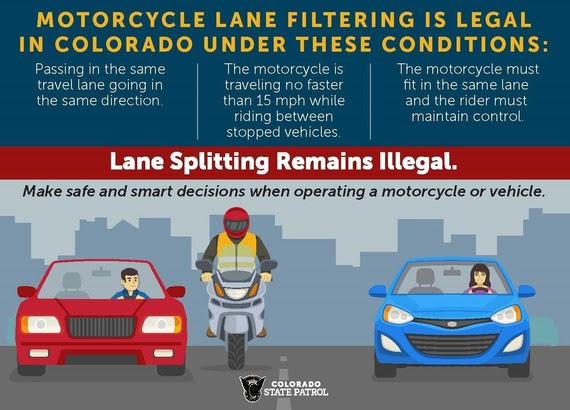(COLO) – A new law (SB24-079) allowing motorcyclists in Colorado to lane filter is now in effect. As part of this law, CDOT will complete a SAFETY report over the next three years to determine the impact on Colorado roadways. The law automatically repeals on September 1, 2027.
Lane Filtering is Legal in Colorado Under These Conditions
- To pass, traffic in the rider’s lane and adjacent lanes going the same direction must be at a complete stop.
- The lane must be wide enough to fit the vehicle and motorcycle while passing.
- The motorcycle must go 15 mph or less.
- The rider must pass safely and control the motorcycle.
- The rider must pass on the left and not enter the oncoming traffic lane.
“It’s up to the rider to assess the scene ahead to determine if the conditions are safe and legal to filter – riders should reflect back to their foundational motorcycle licensing course,” stated Col. Packard, chief of the Colorado State Patrol. “Riders will recall learning how important it is to maintain a safety cushion around them, so riding between vehicles places riders in a vulnerable position. Weigh the pros and cons of every scenario before filtering.”
Whether you are a new motorcycle rider or someone with experience, the best way to enjoy the ride is to increase your knowledge and training continually. The Motorcycle Operator Safety Training (M.O.S.T.) offers three courses for every skill level.
“Motorists also need to respect the legality of this new practice for motorcycle riders even if they don’t always understand their motives or driving experience,” explained Col. Packard. “There are frequent gaps of empathy and tolerance between roadway users regardless of vehicle type. It’s not a hierarchy out there; the roads are meant to be shared, and safety is everyone’s responsibility.”

###
ABOUT THE COLORADO STATE PATROL
Since our origin in 1935, the Colorado State Patrol (CSP) has focused on preserving human life and protecting property within our communities. Our 1,100 members embody the core values of Honor, Duty, and Respect in their daily jobs. In addition to our expertise in motor vehicle safety on the state’s roadways, the CSP is responsible for the Governor and other dignitaries’ protection, commercial motor vehicle enforcement, hazardous materials, homeland security, communications, investigative services, criminal interdiction, community education, aviation operations, and more.